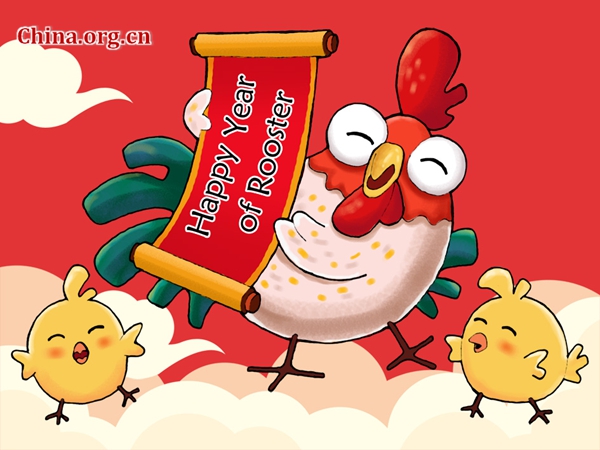Lessons for business in the Year of the Rooster
- By Eugene Clark
 0 Comment(s)
0 Comment(s) Print
Print E-mail China.org.cn, January 29, 2017
E-mail China.org.cn, January 29, 2017
|
|
|
Year of the Rooster [By Zhai Haijun / China.org.cn] |
Carrying on a tradition I started several years ago, here is my "spin" on lessons for business in the Year of the Rooster.
1. First-mover advantage. Roosters are the first ones up to greet the day. In this 24/7 world there is also often a significant advantage of being first into the market, i.e. first mover advantage. E-Bay and Amazon are two good examples of companies that have used their first-mover advantage to maintain an edge over competitors. First-movers can gain a marketing advantage in brand recognition, tie up intellectual property rights such as patents and garner resources that enable them to hold and build on their success.
2. Capable speakers. Roosters know how to crow. They are thus capable speakers and communicators. These are invaluable skills for every business leader.
3. Wake people up. Roosters are the first ones up, but they also sound the clarion call to get everyone else up and moving, too. They are natural cheerleaders for their organization. This is an important quality of leadership. Leaders have a vision for the organization. As the late Muhammed Ali noted, "A rooster crows only when it sees the light. Put him in the dark and he'll never crow. I have seen the light and I'm crowing."
4. Crowing is their game. Roosters know how to crow. They are natural marketers and realize that marketing is a vital process in any successful business. Many grade-A products get beaten out by grade-B products due to better marketing. The old saying, "build a better mousetrap and the world will beat a path to your door" has seldom been true. Many inferior mousetraps are market leaders because of their ability, among other business processes, to market or "crow" about their product.
5. Future oriented. In early times it was believed that roosters had an ability to predict the future. Successful business leaders have an eye on the future and a sixth sense in knowing where an industry is going or what new industry is worth investing in.
6. Warm, generous, sociable. Roosters are noted to be warm, generous and sociable. These are important qualities as they lead and supervise activities in the barnyard.
7. Fighting personality. While most of their time is spent crowing, roosters know how to fight and will defend their territory when they have to. Business is tough and competitive. There are times when fighting is a must if you are to survive.
8. Planning, innovative ways of dealing with things that take people by surprise. Roosters are noted in Chinese lore to be good planners and have innovative ways of dealing with things. In a world where creativity is more important than ever before, these qualities of a rooster are important for business too.
9. Great attention to appearance. Appearance matters. As demonstrated so well by Apple computing, design matters more than ever.
10. A year of the Rooster is often marked by brilliant success. It is thought by some that the Year of the Rooster is one in which a great number of people find brilliant success. While this may be true, it is important to remember that success most often comes as a result of many factors and involves a lot of talent and hard work by many people. Roosters need to remember that while crowing is important, the hens are the ones who lay the eggs. Success also often involves some element of luck or good fortune Finally, it is important to be humble in recognizing that one can easily be a rooster one day and a mere feather duster the next.
An African proverb says that where a rooster crows there is a village. In today's connected world that village is a global one, and we need capable roosters to wake us up to the reality that we have more in common than differences. We are all humans, who share with one another this fragile planet and must learn to progress in ways that are sustainable, constructive and peaceful.
In conclusion, I hope that 2017 will give readers something to get up in the early morning for and crow about as they find happiness and celebrate success.
Eugene Clark is a columnist with China.org.cn. For more information please visit:
http://m.keyanhelp.cn/opinion/eugeneclark.htm
Opinion articles reflect the views of their authors only, not necessarily those of China.org.cn.






